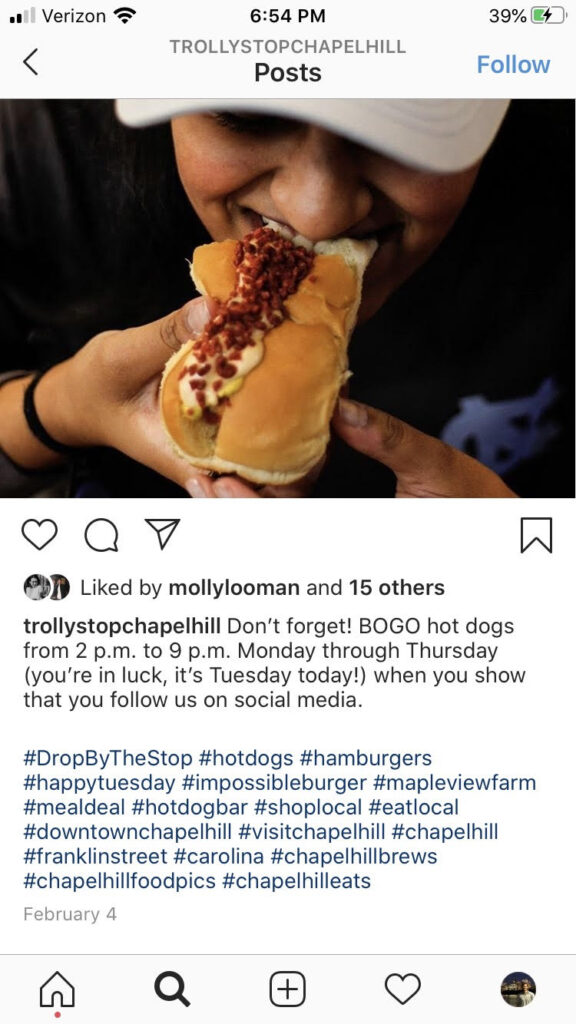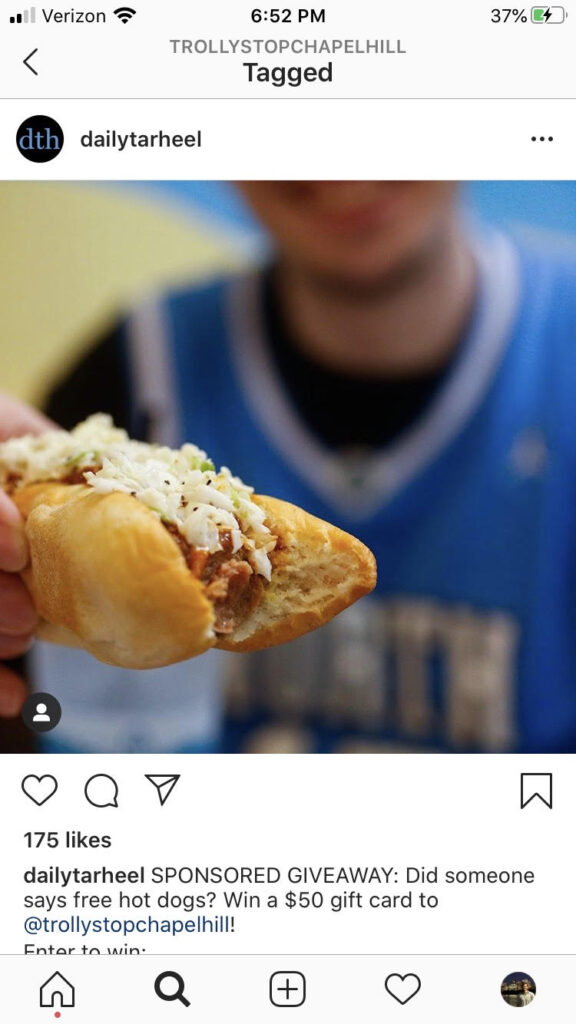Case Study: Trolly Stop
By Devin Fussa
Business Background
Franklin Street’s Trolly Stop is predominantly a hot dog restaurant, with other locations based in Wrightsville Beach, Wilmington and Southport.
Offering a traditional beef and pork dog, Trolly Stop also serves a gluten-free beef-only dog, a fat-free turkey dog and a vegetarian soy protein dog. With freshly made sides, a variety of condiments and their own, unique sauce, Trolly Stop has plenty to offer.
Menu items like the “surfer dog” pay homage to the restaurant’s coastal beginnings, displaying a beachy theme at each of its locations. Located in Chapel Hill since 2014, Trolly Stop has been a welcome addition to Franklin Street.
What the Problem is
Trolly Stop’s Chapel Hill location struggled to tap into the student consumer-base, specifically using social media to connect.
Between tough competition and an already established bar scene, it was difficult for Trolly Stop to solidify itself as a “go-to” restaurant. This is where we came in.
Strategy Used
1893 Brand Studio, through collaboration and direction from Trolly Stop, developed a wide variety of strategies to improve the restaurant’s business.
The initial stages of our partnership included the creation of a monthly social media calendar, whereupon we would post Facebook and Instagram content on a nearly daily basis. Alongside the creation of written content, our multimedia team frequently visited the restaurant to gather photos of Trolly Stop and its food, which were also used in our social media calendars.
Nick Valego, the main campaign strategist on the Trolly Stop account, shed light on some of our plans for the restaurant.
“We wanted to create some kind of special theme night to try and compete with (other restaurants) in the bar scene,” he said. “We wanted to have a deal for the night where we discounted pitches of beer and some food with it, organized around a beach theme. We had really only started offering the pitcher discount when the pandemic hit, but we had even hoped to make custom cups for the pitchers.”
Additionally, we’ve explored the concept of hosting a hot dog eating contest amongst Greek students, an idea that was unable to come to fruition due to the global pandemic. This idea is still feasible however, and will likely be revisited at the appropriate time.




Outcome
Our work with Trolly Stop has certainly netted results, as was apparent by our first semester and January reports.
As of January, Trolly Stop’s social media following had grown, up nearly 100% in likes and page follows on Facebook. Trolly Stop’s Instagram following also saw a spike after a giveaway promotion we’d helped coordinate.
The end of our semesterly report in December indicated growth as well, suggesting Trolly Stop’s social media presence has seen continued improvement overtime. Our initial tests for the Monday bar special weren’t overly successful, but prior to the sudden impact of COVID-19, this was a relatively new experiment and we’d hoped for eventual improvement in attendance.
Analysis
In short, we’ve established a baseline with Trolly Stop, but will need to develop and execute new ideas in order to facilitate genuine growth. While recorded social media numbers in January had risen above their previous standings by significant margins, social media won’t overly impact the success of Trolly Stop. Frankly, the arrival of COVID-19 was particularly ill-fated for Trolly Stop, as many of the previously mentioned projects, such as a Monday bar night, pit sitting, or even Greek community involvement, were unable to gain traction due to the sudden departure of students from campus.
Looking forward towards the semester, these events will definitely help Trolly Stop grow in terms of campus recognition. Through our partnership, we look forward to working with Trolly Stop, beginning an estimated six month period of strong social media content and engaging events (working around the difficulties of COVID) to draw the attention and support of the student community at its Chapel Hill location.
In course, we also want to help the restaurant set its sights towards branching into the sports culture of the university. While Trolly Stop already has advertisements at football games, expanding into other sports, such as basketball, would certainly help. Furthermore, selling Trolly Stop hotdogs at games, while difficult, should be a proposition we collectively hope to bring to the University.
Lastly, 1893 Brand Studio also wants to further emphasize Trolly Stop’s unique beach theme to customers.
“For the future, we definitely just need to go all the way with the theme,” said Nick Valego. “The inside of the restaurant has a strong beach theme, so if that’s the vibe we stick with, we need to more effectively incorporate it into our social media and branding.” By advertising “Hawaiian nights” or similar events, and by slightly tuning its social media content, we can help Trolly Stop better tap into its origins and hold a stronger identity.
